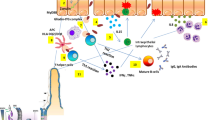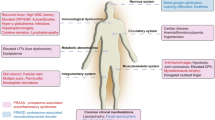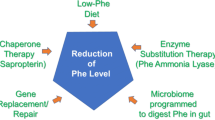Abstract
Prior to 2006 therapy for glycogen storage diseases consisted primarily of dietary interventions, which in the case of glycogen storage disease (GSD) type II (GSD II; Pompe disease) remained essentially palliative. Despite improved survival and growth, long-term complications of GSD type I (GSD I) have not responded to dietary therapy with uncooked cornstarch or continuous gastric feeding. The recognized significant risk of renal disease and liver malignancy in GSD I has prompted efforts towards curative therapy, including organ transplantation, in those deemed at risk. Results of clinical trials in infantile Pompe disease with alglucosidase alfa (Myozyme) showed prolonged survival reversal of cardiomyopathy, and motor gains. This resulted in broad label approval of Myozyme for Pompe disease in 2006. Furthermore, the development of experimental therapies, such as adeno-associated virus (AAV) vector-mediated gene therapy, holds promise for the availability of curative therapy in GSD I and GSD II/Pompe disease in the future.
Similar content being viewed by others
Abbreviations
- AAV:
-
adeno-associated virus
- AFP:
-
alpha-fetoprotein
- CRIM:
-
cross-reacting immune material negative
- ERT:
-
enzyme replacement therapy
- G6Pase:
-
glucose-6-phosphatase
- G6Pase-KO:
-
G6Pase knockout
- GAA-KO:
-
GAA knockout
- Glc4 :
-
Glcα1-6Glcα1-4Glcα1-4Glc
- GSD I:
-
glycogen storage disease type I
- GSD II:
-
glycogen storage disease type II
- GSD:
-
glycogen storage disease
- HCC:
-
hepatocellular carcinoma
- rhGAA:
-
recombinant human acid alpha-glucosidase
References
Amalfitano A, McVie-Wylie AJ, Hu H, et al (1999) Systemic correction of the muscle disorder glycogen storage disease type II after hepatic targeting of a modified adenovirus vector encoding human acid-alpha-glucosidase. Proc Natl Acad Sci USA 96: 8861–8866.
Amalfitano A, Bengur AR, Morse RP, et al (2001) Recombinant human acid alpha-glucosidase enzyme therapy for infantile glycogen storage disease type II: results of a phase I/II clinical trial. Genet Med 3: 132–138.
An Y, Young SP, Kishnani PS, et al (2005) Glucose tetrasaccharide as a biomarker for monitoring the therapeutic response to enzyme replacement therapy for Pompe disease. Mol Genet Metab 85: 247–254.
Beaty RM, Jackson M, Peterson D, et al (2002) Delivery of glucose-6-phosphatase in a canine model for glycogen storage disease, type Ia, with adeno-associated virus (AAV) vectors. Gene Ther 9: 1015–1022.
Bijvoet AG, Van Hirtum H, Kroos MA, et al (1999) Human acid alphaglucosidase from rabbit milk has therapeutic effect in mice with glycogen storage disease type II. Hum Mol Genet 8: 2145–2153.
Brix AE, Howerth EW, McConkie-Rosell A, et al (1995) Glycogen storage disease type Ia in two littermate Maltese puppies. Vet Pathol 32: 460–465.
Chamoles NA, Niizawa G, Blanco M, Gaggioli D, Casentini C (2004) Glycogen storage disease type II: enzymatic screening in dried blood spots on filter paper. Clin Chim Acta 347: 97–102.
Chen Y-T (2001) Glycogen storage diseases. In: Scriver CR, Beaudet al, Sly WS, Valle D, eds; Childs B, Kinzler KW, Vogelstein B, assoc, eds. The Metabolic and Molecular Bases of Inherited Disease, 8th edn. New York: McGraw-Hill, 1521–1551.
Chen Y-T, Cornblath M, Sidbury JB (1984) Cornstarch therapy in type I glycogen-storage disease. N Engl J Med 310: 171–175.
Cresawn KO, Fraites TJ, Wasserfall C, et al (2005) Impact of humoral immune response on distribution and efficacy of recombinant adeno-associated virus-derived acid alpha-glucosidase in a model of glycogen storage disease type II. Hum Gene Ther 16: 68–80.
Desnick RJ (2004) Enzyme replacement and enhancement therapies for lysosomal diseases. J Inherit Metab Dis 27: 385–410.
Ding EY, Hodges BL, Hu H, et al (2001) Long-term efficacy after [E1-, polymerase-] adenovirus-mediated transfer of human acid-alphaglucosidase gene into glycogen storage disease type II knockout mice. Hum Gene Ther 12: 955–965.
Franco LM, Krishnamurthy V, Bali D, et al (2005a) Hepatocellular carcinoma in glycogen storage disease type Ia: a case series. J Inherit Metab Dis 28: 153–162.
Franco LM, Sun B, Yang X, et al (2005b) Evasion of immune responses to introduced human acid alpha-glucosidase by liver-restricted expression in glycogen storage disease type II. Mol Ther 12: 876–884.
Ghosh A, Allamarvdasht M, Pan CJ, et al (2006) Long-term correction of murine glycogen storage disease type Ia by recombinant adeno-associated virus-1-mediated gene transfer. Gene Ther 13: 321–29.
Hirschhorn R, Reuser AJJ (2001) Glycogen storage disease type II: acid alpha-glucosidase (acid maltase) deficiency. In: Scriver CR, Beaudet al, Sly WS, Valle D, eds; Childs B, Kinzler KW, Vogelstein B, assoc, eds. The Metabolic and Molecular Bases of Inherited Disease, 8th edn. New York: McGraw-Hill, 3389–3419.
Hoefsloot LH, Hoogeveen-Westerveld M, Reuser AJ, Oostra BA (1990) Characterization of the human lysosomal alpha-glucosidase gene. Biochem J 1: 493–497.
Keller KM, Schutz M, Podskarbi T, Bindl L, Lentze MJ, Shin YS (1998) A new mutation of the glucose-6-phosphatase gene in a 4-year-old girl with oligosymptomatic glycogen storage disease type 1a. J Pediatr 132: 360–361.
Kikuchi T, Yang HW, Pennybacker M, et al (1998) Clinical and metabolic correction of Pompe disease by enzyme therapy in acid maltase-deficient quail. J Clin Invest 101: 827–833.
Kishnani PS, Bao Y, Wu JY, Brix AE, Lin JL, Chen YT (1997) Isolation and nucleotide sequence of canine glucose-6-phosphatase mRNA: identification of mutation in puppies with glycogen storage disease type Ia. Biochem Mol Med 61: 168–177.
Kishnani PS, Faulkner E, VanCamp S, et al (2001) Canine model and genomic structural organization of glycogen storage disease type Ia (GSD Ia). Vet Pathol 38: 83–91.
Kishnani P, Corzo D, Nicolino M, et al (2007) Recombinant human acid alpha-glucosidase: major clinical benefits in infantile-onset Pompe disease. Neurology 68: 99–109.
Kishnani PS, Hwu WL, Mandel H, Nicolino M, Yong F, Corzo D (2006a) A retrospective, multinational, multicenter study on the natural history of infantile-onset Pompe disease. J Pediatr 148: 671–676.
Kishnani PS, Nicolino M, Voit T, et al (2006b) Chinese hamster ovary cell-derived recombinant human acid alpha-glucosidase in infantile-onset Pompe disease. J Pediatr 149: 89–97.
Koeberl DD, Sun BD, Damodaran TV, et al (2006) Early, sustained efficacy of adeno-associated virus vector-mediated gene therapy in glycogen storage disease type Ia. Gene Ther 13: 457–462.
Lei KJ, Chen H, Pan CJ, et al (1996) Glucose-6-phosphatase dependent substrate transport in the glycogen storage disease type-1a mouse. Nat Genet 13: 203–209.
Lerut JP, Ciccarelli O, Sempoux C, et al (2003) Glycogenosis storage type I diseases and evolutive adenomatosis: an indication for liver transplantation. Transpl Int 16: 879–884.
Li Y, Scott CR, Chamoles NA, et al (2004) Direct multiplex assay of lysosomal enzymes in dried blood spots for newborn screening. Clin Chem 50: 1785–1796.
Martiniuk F, Mehler M, Tzall S, Meredith G, Hirschhorn R (1990) Sequence of the cDNA and 5′-flanking region for human acid alpha-glucosidase, detection of an intron in the 5′ untranslated leader sequence, definition of 18-bp polymorphisms, and differences with previous cDNA and amino acid sequences. DNA Cell Biol 9: 85–94.
Millington DS (2005) Newborn screening for lysosomal storage disorders. Clin Chem 51: 808–809.
Muraca M, Burlina AB (2005) Liver and liver cell transplantation for glycogen storage disease type IA. Acta Gastroenterol Belg 68: 469–472.
Muraca M, Gerunda G, Neri D, et al (2002) Hepatocyte transplantation as a treatment for glycogen storage disease type 1a. Lancet 359: 317–318.
Niizawa G, Levin C, Aranda C, Blanco M, Chamoles NA (2005) Retrospective diagnosis of glycogen storage disease type II by use of a newbornscreening card. Clin Chim Acta 359: 205–206.
Pauly DF, Fraites TJ, Toma C, et al (2001) Intercellular transfer of the virally derived precursor form of acid alpha-glucosidase corrects the enzyme deficiency in inherited cardioskeletal myopathy Pompe disease. Hum Gene Ther 12: 527–538.
Perlman M, Aker M, Slonim AE (1979) Successful treatment of severe type I glycogen storage disease with neonatal presentation by nocturnal intragastric feeding. J Pediatr 94: 772–774.
Ponce E, Witte DP, Hirschhorn R, Huie ML, Grabowski GA (1999) Murine acid alpha-glucosidase: cell-specific mRNA differential expression during development and maturation. Am J Pathol 154: 1089–1096.
Raben N, Danon M, Gilbert AL, et al (2003) Enzyme replacement therapy in the mouse model of Pompe disease. Mol Genet Metab 80: 159–169.
Sun B, Chen YT, Bird A, et al (2003) Packaging of an AAV vector encoding human acid alpha-glucosidase for gene therapy in glycogen storage disease type II with a modified hybrid adenovirus-AAV vector. Mol Ther 7: 467–477.
Sun B, Zhang H, Franco LM, et al (2005) Efficacy of an adeno-associated virus 8-pseudotyped vector in glycogen storage disease type II. Mol Ther 11: 57–65.
Sun MS, Pan CJ, Shieh JJ, et al (2002) Sustained hepatic and renal glucose-6-phosphatase expression corrects glycogen storage disease type Ia in mice. Hum Mol Genet 11: 2155–2164.
Tripathy SK, Black HB, Goldwasser E, Leiden JM (1996) Immune responses to transgene-encoded proteins limit the stability of gene expression after injection of replication-defective adenovirus vectors. Nat Med 2: 545–550.
Van Den HH, Reuser AJ, Vulto AG, et al (2000) Recombinant human alpha-glucosidase from rabbit milk in Pompe patients. Lancet 356: 397–398.
Van Hove JL, Yang HW, Wu JY, Brady RO, Chen YT (1996) High-level production of recombinant human lysosomal acid alpha-glucosidase in Chinese hamster ovary cells which targets to heart muscle and corrects glycogen accumulation in fibroblasts from patients with Pompe disease. Proc Natl Acad Sci USA 93: 65–70.
Young SP, Corzo D, Kishnani P, et al (2005) Diagnostic value of urinary and plasma glucose tetrasaccharides in infantile and late onset glycogen storage disease type II. Mol Genet Metab 84: 241–242.
Zingone A, Hiraiwa H, Pan CJ, et al (2000) Correction of glycogen storage disease type 1a in a mouse model by gene therapy. J Biol Chem 275: 828–832.
Author information
Authors and Affiliations
Corresponding author
Additional information
Communicating editor: Verena Peters
Competing interests: D. D. Koeberl, P. Kishnani and Y. T. Chen have received research/grant support from Genzyme Corporation. P. Kishnani is a member of the Pompe Disease Advisory Board for Genzyme Corporation. Y.T. Chen has served as a consultant for Genzyme. The clinical trials with rhGAA were supported by a grant from Genzyme Corporation at the various sites where patients were treated. rhGAA, in the form of Genzyme’s product, Myozyme, has now been approved by the US FDA and the European Union as therapy for Pompe disease. Duke University and the developers of the method of treatment and predecessors of the cell lines used to generate the enzyme (rhGAA) used in this clinical trial may benefit financially pursuant to the University’s Policy on Inventions, Patents and Technology Transfer, even if those cell lines are not used in the commercialized therapy.
Rights and permissions
About this article
Cite this article
Koeberl, D.D., Kishnani, P.S. & Chen, Y.T. Glycogen storage disease types I and II: Treatment updates. J Inherit Metab Dis 30, 159–164 (2007). https://doi.org/10.1007/s10545-007-0519-9
Received:
Revised:
Accepted:
Published:
Issue Date:
DOI: https://doi.org/10.1007/s10545-007-0519-9




